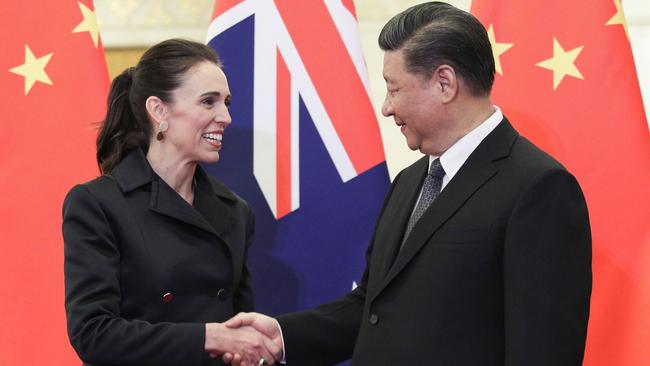Has NZ chosen China trade over mateship with us?

More than 600,000 New Zealanders live in Australia, 60,000 Australians in New Zealand; and, until the pandemic, citizens of both countries enjoyed almost unrestricted access to live and work on either side of the ditch.
The Australia-New Zealand Closer Economic Relations Trade Agreement was signed in 1983, creating a free trade zone with zero tariffs for goods and services originating in Australia or New Zealand, harmonisation of trans-Tasman food standards, mutual recognition of goods and occupations, and a protocol to liberalise two-way investment.
Then add into the mix a history of shared military commitments from Gallipoli and through the major conflicts of the 20th and 21st centuries, together with our membership of the Five Eyes intelligence alliance.
In short, leaving rugby aside for the moment (please!), Australia and New Zealand have enjoyed the closest of bilateral relationships for more than a century. On Saturday Scott Morrison will travel to New Zealand for the annual Australia-New Zealand Leaders Meeting.
In announcing Morrison’s visit, New Zealand’s Prime Minister, Jacinda Ardern, described the relationship with Australia as New Zealand’s “closest and most important”. But that historically tight relationship has been under serious strain lately and the reason can be summed up in one word: China.
While Australia remains in China’s diplomatic doghouse, suffering through a deterioration in trade relations with its largest export market, New Zealand’s trade relationship with China goes from strength to strength. China is New Zealand’s largest goods market, largest source of international students, second largest source of tourists (behind Australia) and a significant foreign investor. And in January the two countries signed an upgraded free trade agreement. When tourism numbers have crashed because of pandemic restrictions, the $10 billion of agricultural exports that New Zealand sends to China annually takes on even greater significance.
But the buoyancy in the NZ-China relationship has coincided with a dip in the trans-Tasman partnership. New Zealand’s current issues with Australia (and its other Five Eyes partners) rests not with New Zealand’s trade success but with a growing perception that New Zealand has gained China’s approbation at the expense of its commitment to the shared values of its Five Eyes alliance partners in Australia, the US, Britain and Canada.
New Zealand opted not to join its Five Eyes partners in openly criticising China’s actions in Hong Kong and Xinjiang, and New Zealand Foreign Affairs Minister Nanaia Mahuta recently signalled that NZ considered such matters to be “out of the remit of the Five Eyes”. Instead, New Zealand would respect China’s “particular customs, traditions and values”.
This statement came on top of an earlier suggestion from New Zealand Trade Minister Damien O’Connor that if only Australia would follow New Zealand’s approach and show China’s government “respect” and exercise “a little more diplomacy”, Australia too would be rewarded by China as New Zealand had been. Although he quickly walked back those comments, they will not be forgotten soon in Canberra and, rightly or wrongly, the message received on this side of the Tasman was that our Anzac partner had chosen profit over partnership and commercial convenience with China over diplomatic support for Australia in its hour of need.
Not surprisingly, New Zealand’s public instruction of Australia in how to “get along” with China was greeted with scarcely concealed joy in Beijing. Chinese Foreign Ministry spokesman Wang Wenbin praised New Zealand’s “positive attitude in attaching importance to and working to develop China-New Zealand ties”. And when China’s Global Times stepped up its attacks on the Five Eyes partnership as an “axis of white supremacy”, suggesting racism, colonialism and anti-China sentiment lay at the heart of the alliance, it specifically exempted New Zealand from the criticism – a logical non sequitur, perhaps, but highlighting China’s desire to reward the New Zealand government for its less confrontational approach.
Even when Ardern sought to rebalance the rhetoric coming out of Wellington somewhat by noting there were “some things on which China and New Zealand do not, cannot and will not agree” and that the differences between the two countries’ “interests and values” were becoming “harder to reconcile”, Global Times ran an article under the headline “New Zealand stands to gain from Australia’s loss in China”, touting New Zealand’s ability to fill gaps created by China’s energetic rejection of Australian exports. The article concluded that the benefits reaped by New Zealand under enhanced trade arrangements “should teach Australia and other Western economies a lesson”.
And that lesson is simple: criticise China and suffer trade and diplomatic pain; keep quiet about China’s human rights abuses in Hong Kong and Xinjiang, or its regional expansionism, and be rewarded with tasty trade deals.
New Zealand appears to have taken the lesson on board and has been rewarded with a giant panda stamp on its homework.
So when the prime ministers of Australia and New Zealand sit down together for bilateral talks in coming days, it won’t be just tourism and travel bubbles that are being discussed. The first item on the agenda should be how to ensure that Australia and New Zealand don’t forget the hard lessons learned together at Gallipoli and in the 106 years since.
Mark Watson is a former diplomat, most recently serving in Washington, and is strategic adviser on national security for Bondi Partners, a US-Australia consultant group.



New Zealand and Australia are close neighbours. Not physically (Auckland is more than 2000km from Sydney) but culturally, historically and via the extensive family and business relationships that stretch across the Tasman Sea and back again.